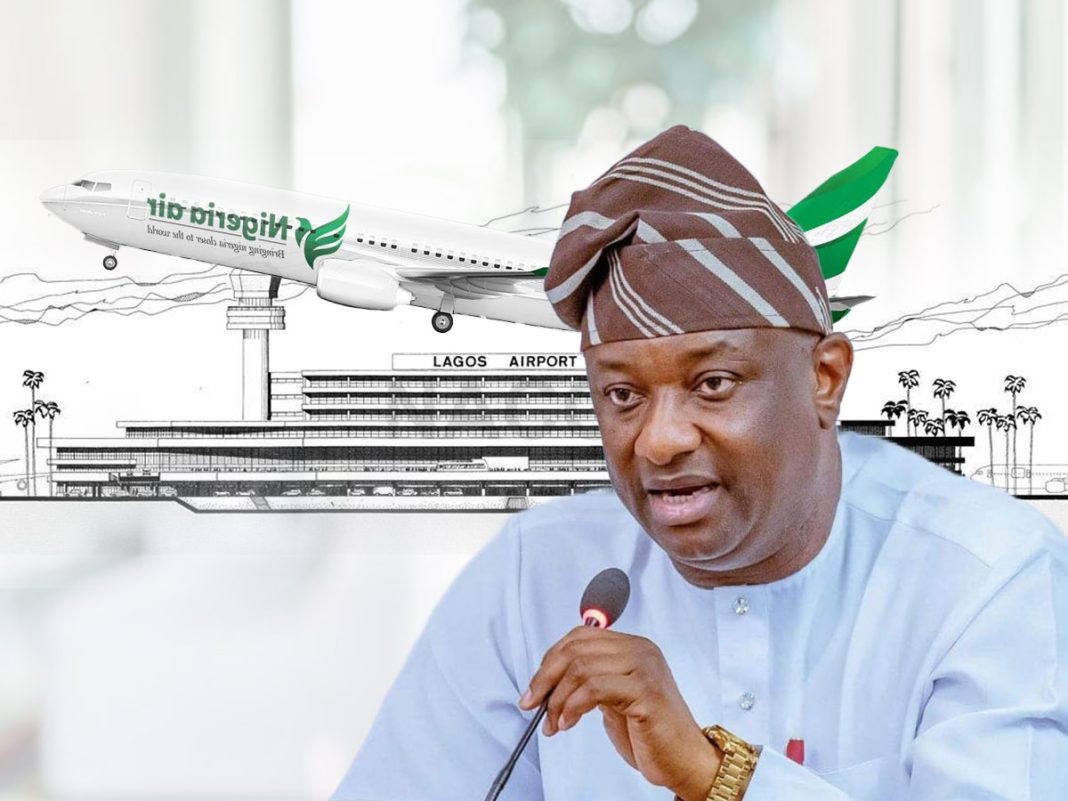The Federal Government has officially dropped plans to revive Nigeria’s national airline, choosing instead to focus on helping local carriers grow stronger and more competitive. This was revealed by Minister of Aviation and Aerospace Development, Festus Keyamo, during a recent event in Lagos.
Speaking at the public presentation of the book “100 Years of Civil Aviation in Nigeria: History, Issues and Prospects” written by aviation journalist Wole Shadare, Keyamo said that building a new national airline is no longer on the table. Instead, the government wants to support existing Nigerian airlines through better policies and improved infrastructure.
One major step in that direction, he said, is the decision by the FG to demolish Lagos airport terminal—specifically the old terminal building at the Murtala Muhammed International Airport (MMIA). According to the minister, the terminal is outdated and in poor condition, and a new, modern structure will be built in its place to better serve passengers and airlines.
“We have shifted our focus to ensuring the growth and development of local operators through our policies,” Keyamo stated. He added that the Tinubu-led administration has already rolled out several reforms, including changes to insurance regulations for leased aircraft, which will make planes more accessible to local airlines and help bring down ticket prices for domestic flights.
The minister also mentioned that air traffic personnel have been undergoing retraining to improve service delivery, and measures are now in place to reduce revenue leakages across the sector. Furthermore, almost all international airlines flying into Nigeria have now complied with a directive to use Nigerian in-flight catering companies, creating more local business opportunities.
Read Also: Hong Kong to Admit More Foreign Students After U.S. Crackdown on Harvard
Speaking at the same event, the Managing Director of the Federal Airports Authority of Nigeria (FAAN), Mrs. Olubunmi Kuku, said Nigeria’s aviation sector is growing fast. She noted that there are currently 39 certified airline operators in the country, 31 functioning airports, and over 2,100 licensed pilots.
Kuku revealed that air transport now contributes about $1.7 billion to Nigeria’s gross domestic product (GDP), with private airlines connecting cities more efficiently than ever and international carriers showing strong interest in the Nigerian market.
Despite this progress, she admitted that there are still challenges, including infrastructure problems, regulatory hurdles, and the need for better funding. However, she expressed optimism, saying the country has come a long way since independence.
“In 1960, after gaining independence, Nigeria had to figure out how to turn colonial infrastructure into a successful aviation sector. We created Nigeria Airways to achieve this, but it later struggled due to poor management,” Kuku said.
She explained that the private sector stepped in and transformed the landscape, bringing in new money, better management, and competition. Airlines like Air Peace and Arik Air have not only filled the gap left by Nigeria Airways but have also reshaped the industry with modern practices.
“These improvements have made Nigeria a case study in the success of market-driven reforms,” she added. “Last year, over 16 million people traveled through our local airports, and more than 3.5 million international travelers used Nigerian terminals. That’s a strong sign of growth, but there’s still room to improve.”
The book’s author, Wole Shadare, said the 25-chapter publication offers a deep dive into Nigeria’s aviation history, covering its highs, lows, and potential for the future. He believes it will be useful for researchers, policymakers, and anyone interested in the industry’s journey.
With the national carrier project now shelved and the FG set to demolish Lagos airport terminal as part of its infrastructure upgrade, the government is clearly choosing practical reforms over symbolic gestures. According to Keyamo, it’s all part of a broader plan to support a sustainable, competitive aviation industry driven by private sector growth.
By deciding that the FG will demolish Lagos airport terminal and back local carriers instead of reviving a national airline, the Tinubu administration is charting a new path—one that aims to modernize the industry and better serve Nigerian travelers.




